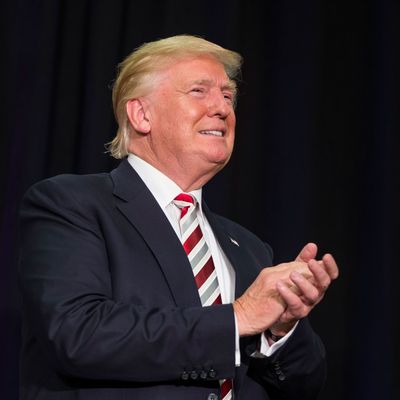
One month before Donald Trump launched his campaign for the presidency, Pew Research asked Republican voters whether free-trade agreements had been a good or bad thing for the United States. Fifty-one percent said that such deals had been good for America, while 39 percent said the opposite. Now, 14 months into the GOP nominee’s quest to make America great again, those numbers have flipped.
According to a Pew Research survey released Thursday, 61 percent of Republicans think free-trade agreements have hurt their country, while just 32 percent think they’ve helped. GOP voters have never viewed “free trade” this negatively since Pew first began soliciting their views on the subject in 2009.
With the possibility of Trump winning the White House in November looking increasingly remote, one of the biggest questions in American politics has become whether or not “Trumpism” will outlive the 2016 cycle. Which is to say: Will the GOP of tomorrow be a party that disdains international trade agreements, neoconservative foreign policy, and expansionary immigration. Pew’s findings suggest that Trump has had a profound influence on the ideological leanings of Republican voters. But whether or not that influence will survive a fall landslide remains uncertain.
On the one hand, the fact that GOPers’ views of trade shifted so dramatically — over such a short time period — might betray the malleability of the average Republican voter’s opinion on an issue as abstract as the rules governing global commerce. From this angle, Republican opposition to trade isn’t motivated by any ideological awakening, but rather by the symbolic charge the issue has taken in this particular campaign: As the GOP nominee has encouraged voters to associate “free trade” with “bad deals” negotiated by the Clintons, Red America has taken a dimmer view of the term.
On the other hand, it’s possible that rank-and-file Republicans have always harbored doubts about free trade, but partisan signaling suppressed their skepticism. Now that the genie is out of the bottle, however, the GOP will remain a protectionist party for the medium-term. Adding currency to this view is the broader reaction against “globalism” that has energized conservative politics in other Western nations.
Meanwhile, Democrats remain broadly supportive of free-trade agreements, both past and present. Fifty-eight percent of Team Blue told Pew that free-trade agreements have been good for the U.S., while only 34 percent said that they have been bad for the country. More significantly, the overwhelmingly Democratic subset of the electorate that identify as “Clinton supporters” backs the Trans-Pacific Partnership by a more than a 2-to-1 margin — despite the Democratic nominee’s official opposition to the trade deal.
President Obama plans to spend much of the next few months barnstorming America in support of the TPP. He is expected to push for its passage during the lame duck session of Congress, as a kind of capstone to his legacy.
It is a testament to the intensity of anti-TPP activism that Clinton has been willing to defy the will of the president — and her own supporters — in opposing the agreement. But the fact that 55 percent of Clinton voters back the TPP is the best news its boosters have received in some time. And the finding suggests that a sustained public push for the agreement by the popular sitting president could erode some congressional Democrats’ opposition to the deal.
The best hope for anti-TPP progressives, then, may be that Trumpists retain control of the Republican House caucus this winter: By a margin of 58 to 17 percent, Trump supporters oppose the deal.






























